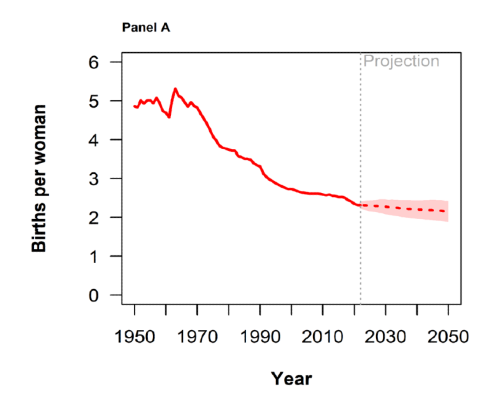Seeing the world how it is – Factfulness

One idea that currently catches my attention stems from one of the books I am reading: “Propaganda” by Edward Bernays. It's the idea that what most influences our world view today is not censorship but information flood.
A flooding of information which must not even be false, but selective or interpreted in a specific way that may lead to a misconception of the world.
Our view of the world is systematically flawed. By 'systematically,' I don't just mean that there are gaps in our knowledge—I mean that we actively hold beliefs about the world that are fundamentally disconnected from reality.
This article will therefore concern the topic of cultivating a fact-based worldview and offer tools to do that.
To make my point, I would like you to click the following link below to take a short test comprised of 13 questions about our world. It should take you no longer than 3 to 5 minutes. After the short test, let's move on.
Here the test provided by Gapminder: https://upgrader.gapminder.org/t/2017-gapminder-test/2
Done? Great!
On average, people get 2.2 out of 12 questions right (they added one question). That's less than what you would be expected to get right if you knew nothing about the world and just guessed. Then you would get about 33% right (cause there are always 3 possible answers) or 4 out of 12 questions.
That's what I mean by saying systematically mis conceptualised.
The author of the book “Factfulness” Hans Rosling describes 10 dramatic instincts, that cause our world view to be biased. Don't feel obliged to read them all, you can just skim them:
- The Gap Instinct – The tendency to divide the world into two distinct groups. Here, Rosling gives the example that people think of the world divided into wealthy western countries and poor Third World countries.
As a rule of thumb, to combat the gap instinct, we can look for the majority. In our case, most countries are neither rich nor extremely poor. Most countries belong into the middle-income category.

- The Negativity Instinct – The belief that the world is getting worse when, in reality, many aspects of human life (health, poverty, education) have improved significantly.
As a rule of thumb, you should expect bad news. Media that features bad news for many psychological reasons, like loss aversion, is much more attention grabbing, than news about things that go well.
Activists also tend to draw out worst-case scenarios or show extreme examples that grasp our attention, for us to respect potential dangers, that are still far in the future. Often those are not the most realistic scenarios.
- The Straight Line Instinct – The assumption that trends will continue in a straight line, ignoring that many trends eventually flatten or change direction.
Many people believe that the world population will just keep on growing at the speed, it is growing right now. With higher income levels and education, lower fertility rates (average number of children born to a woman) are to be expected.

As a general rule, avoid simply extending current trends into the future. Don't assume that patterns will remain unchanged.
- The Fear Instinct – The tendency to focus on things that scare us (e.g., natural disasters, plane crashes) even when they are statistically rare.
Charity organizations receive significantly more donations when they showcase images of earthquake victims. In contrast, far less is given to address the lack of basic infrastructure or essentials like soap—even though diseases like diarrhoea claim far more lives than natural disasters.
A rule of thumb can be to calculate and compare the risk.
- The Size Instinct – The tendency to misinterpret large numbers by lacking a sense of proportion.
As an example, the author points to the UNICEF report which states that in 2016 4.2 million babies worldwide died before the age of one. This number alone would suggest that plenty of things went wrong.
That's actually a historically low number. In 2015, it was 4.4 and in 1950 it was 14.4 million.
As the rule of thumb, set large number into proportion.
- The Generalisation Instinct – The tendency to assume that a particular group or category is homogeneous, leading to stereotypes and oversimplifications.
We can only function using simplifications of the world. It's perfectly normal to think in categories. It becomes problematic if your categories are too rigid. Then they become misleading.
As the rule of thumb, regularly question your categories. Look for differences within groups or similarity across groups.
- The Destiny Instinct – The belief that certain people, cultures, or countries are destined to remain the way they are, ignoring change and progress.
As the rule of thumb, remember that change happens slowly.
Cultures, economies, and societies change gradually over time. Don’t assume that things are fixed and unchangeable. Changes are often happening slowly—observe historical progress.
- The Single Perspective Instinct – The preference for simple, single-cause explanations rather than recognising the complexity of issues.
As a rule of thumb, get a toolbox instead of just a hammer.
No single solution fits all problems. Be open to different viewpoints, and combine multiple sources of information rather than relying on a single ideology or expert.
- The Blame Instinct – The habit of looking for a single culprit to blame for issues rather than understanding systemic causes.
Here the rule of thumb can be to look for systems, not scapegoats.
Problems are often due to complex interactions rather than one person’s or institution’s fault.
- And finally… The Urgency Instinct – The tendency to feel pressured into immediate action, typically resulting in rushed and irrational decisions.
As a rule of thumb: Just take a deep breath.
Most decisions are not as urgent as they seem—pausing to assess the situation can lead to better, more rational choices.
I wrote this article based on the book “Factfulness” by Hans Rosling. If you like, you can listen to the audio version on Spotify:
If you know someone who could benefit from this article, please share it.
Until next time!